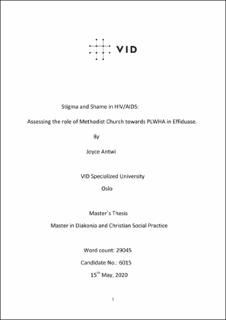Stigma and shame in HIV/AIDS: Assessing the role of methodist church towards PLWHA in effiduase.
Master thesis
Permanent lenke
https://hdl.handle.net/11250/2825389Utgivelsesdato
2020Metadata
Vis full innførselSamlinger
Sammendrag
The purpose of this study is to examine the role of the local congregation in the Effiduase Methodist Church towards people living with HIV/AIDS in relation to stigma and shame. The study was conducted with the use of qualitative method. The study gathered 12 respondents from the leaders and some members of the congregation for an interview in accessing the role of the Methodist church towards people living with HIV/AIDS in relation to stigma and shame. The research analysed stigma and shame with the use of diakonia and Goffman’s theory of stigma. Effiduase was chosen as the research area due to the fact that the town is located in Ashanti region, which is the second largest region in Ghana and also the second largest infected rate of HIV/AIDS in the country (GAC, 2018). Effiduase as the district capital town is mostly youth dominant as more of the youth migrate from the surrounding villages to the town for economic and other social activities. The youthful population in the region makes the people easily prone to HIV/AIDS and other sexual diseases as a result of the town being located within a region considered to be the second highest rate of HIV/AIDS infection. The high rate of unemployment in the town has been a factor for people to engage in sexual promiscuity especially women in order to fend for themselves. The statistic also shows that the rate of women infection is higher than men in the country therefore, making them vulnerable to acquire the disease (GAC, 2018). The rate of HIV/AIDS infections in the region and its surrounding districts is very alarming and therefore calls for concern. The leaders of the local congregations formed major stakeholders in working to fight stigma and shame associated with people affected by HIV/AIDS diseases. The local congregations in recent time have become part of the educational agency in raising the awareness of HIV/AIDS and also helping to reduce the impact of stigma and shame by people living with HIV/AIDS (Nicolson, 1995). Unfortunately, some of the leaders of the congregations and its members sometimes, portray negative attitude towards people living with HIV/AIDS with the notion that the disease is transmitted due to unethical sexual practices which is against the doctrine of Christian religion (Chitando, 2007). The findings will impart positively in reducing the stigma and shame surrounding people living with HIV/AIDS through the activities of the church in engaging spiritual, financial support and counselling that could bring hope to people living with the disease.
